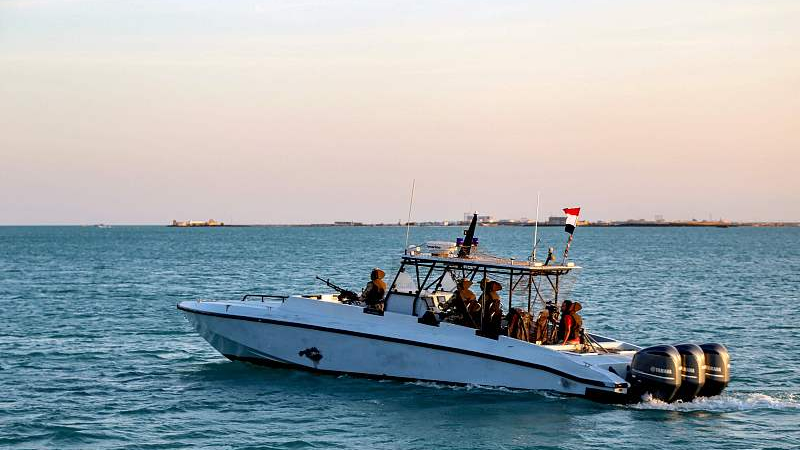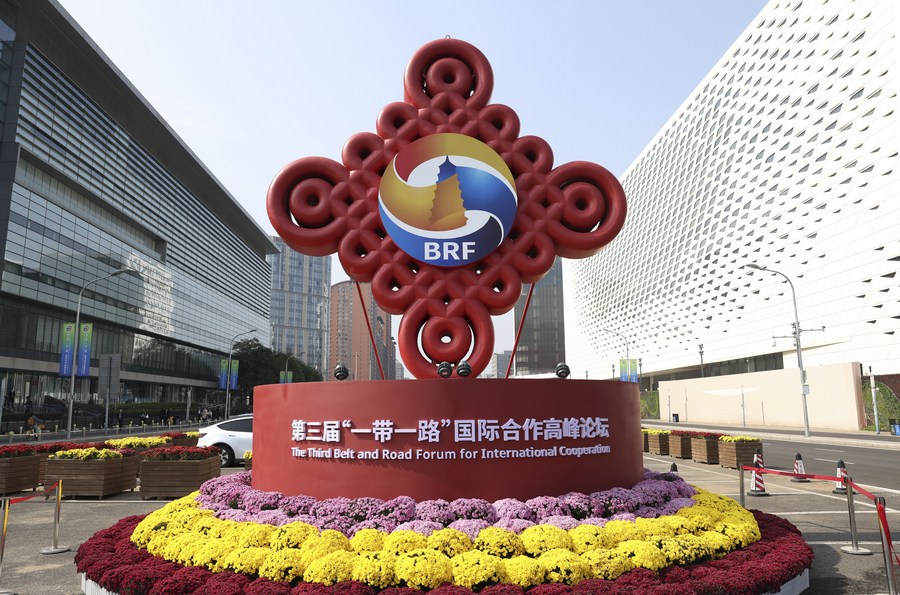Members of the Yemeni Coast Guard, loyal to the internationally recognized government, sail a patrol boat in the Red Sea near the government-held city of Moga in western Taiz province on December 12, 2023. /CFP
Members of the Yemeni Coast Guard, loyal to the internationally recognized government, sail a patrol boat in the Red Sea near the government-held city of Moga in western Taiz province on December 12, 2023. /CFP
Editor’s note: Yasiru Ranaraja, CGTN’s featured commentator on current affairs, is a researcher on maritime affairs and a BRI development expert. He currently serves as the Director of the Belt and Road Initiative of Sri Lanka (BRISL). The article reflects the views of the author and not necessarily those of CGTN.
The Red Sea, historically a major route for international trade, is now a focal point of increasing conflict. Rockets and drones raining down on merchant ships have led to a re-evaluation of global maritime security and trade routes. The evolving dynamics of the Red Sea crisis highlight its impact on global trade and the imperative for long-term solutions.
The beginning of the crisis can be traced back to targeted attacks on Israeli-aligned ships by Yemen’s Houthi forces. However, recent events have taken an ominous turn, with seemingly unrelated ships falling victim to this sea battle. Notably, the Panama-flagged No. 9, operated by China’s COSCO, was attacked by a drone, intensifying the stakes.
The attacks prompted oil major BP to temporarily halt exports through the Red Sea, and some of the world’s largest container-shipping companies suspended services in the region.
The decision to divert traffic from the Suez Canal has profound economic implications, especially for Egypt, which is already in financial crisis. The main source of revenue is the Suez Canal, which will bring in about $9.4 billion in the 2022/2023 fiscal year. As the crisis continues, it is forcing a strategic shift in how global trade routes are navigated, challenging the status quo and prompting a reassessment of risk factors.
Long term solutions
To address the multifaceted challenges posed by the Red Sea crisis, long-term solutions are necessary. Diversifying supply chains has become an important strategy to reduce vulnerability to target disruptions. In addition, the development of regional centers is gaining importance as an alternative to relying only on core markets. Such decentralization not only increases resilience, but also contributes to the creation of a more adaptive global trade infrastructure.
The crisis underscores Africa’s potential to play a key role in reshaping global trade dynamics. With a growing population and untapped economic potential, the continent can attract global investment by positioning itself as a favorable location for new energy development. Clean energy projects can act as catalysts for regional economic growth, foster stability and contribute to a more balanced global economic landscape.
The Belt and Road Initiative (BRI), with its extensive port developments around Africa, presents a unique opportunity. Strengthening land-based road networks and integrating them with ports can create a comprehensive infrastructure strategy. This approach not only fosters stability in the region but also aligns with the broader objective of creating interconnected and flexible trade routes.
Decorations for the Third Belt and Road Forum for International Cooperation are seen near the China National Convention Center in Beijing, capital of China, on October 17, 2023. /Xinhua
Decorations for the Third Belt and Road Forum for International Cooperation are seen near the China National Convention Center in Beijing, capital of China, on October 17, 2023. /Xinhua
Amid the escalating Red Sea crisis, the global community and international organizations have an important role to play; In this, the global security initiative proposed by China and the Shanghai Cooperation Organization (SCO) and BRICS can contribute to restoring stability in regional maritime lanes and finding regional security development models.
These organizations can serve as forums for diplomatic dialogue, fostering cooperation among countries to address the root causes of conflicts and reduce the risks associated with the disruption of major trade routes.
The Global Security Initiative focuses on promoting global security cooperation, facilitating discussions aimed at establishing norms and protocols to protect maritime trade. At the same time, the SCO, known for its emphasis on regional stability and security, can provide a platform for affected countries to engage in constructive dialogue, improve understanding and de-escalate.
By using these international organizations, the parties involved in the Red Sea crisis can find ways of peaceful resolution and cooperation. Establishing channels of open communication and diplomatic engagement can significantly contribute to easing tensions and preventing further escalation. In a world grappling with complex geopolitical issues, these organizations and initiatives stand as beacons of hope for fostering understanding and dialogue, essential elements for a stable and secure international maritime environment.
Decentralization of supply chains
As mentioned earlier, the Red Sea crisis underscores the urgency of creating alternative routes and decentralizing supply chain networks. This approach mitigates the risks associated with regional conflicts and helps build antifragile global supply chain systems. Diversification is crucial as reliance on single channels is proving increasingly risky amid geopolitical uncertainty.
As the Red Sea crisis unfolds, it serves as a moving reminder of the vulnerability of global trade routes. Beyond immediate security concerns, the international community should focus on reshaping trade routes, promoting regional development, and building resilient global systems. In navigating this turbulence, there is an opportunity to emerge with strengthened strategies that can withstand geopolitical uncertainties and ensure the stability of global trade in the long run.
(If you’d like to contribute and have specific expertise, please contact us at [email protected]. Follow @thouse_opinions (on Twitter to find the latest commentary in the CGTN comment section.)

. „Gracz. Namiętny pionier w mediach społecznościowych. Wielokrotnie nagradzany miłośnik muzyki. Rozrabiacz”.


